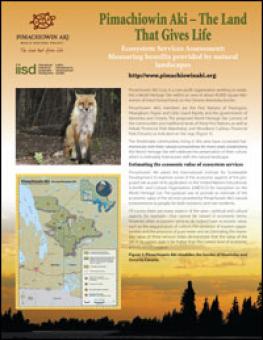
Pimachiowin Aki World Heritage Project Area Ecosystem Services Valuation Assessment (Summary Report)
This short document is a summary of a November 2008 report.
Pimachiowin Aki ("the land that gives life," in Ojibwe) is a non-profit corporation striving to achieve international recognition for an Anishinabe cultural landscape as a United Nations Educational, Scientific and Cultural Organization (UNESCO) World Heritage Site (Province of Manitoba, 2007). This landscape consists of 40,000 km2 of intact natural environments located across Eastern Manitoba and Northwestern Ontario. A detailed document outlining the site's cultural and natural attributes, potential development paths and strategies for its preservation must be devised and presented as part of the nomination process for World Heritage inscription.
This report estimates the economic value of the ecosystem services provided by natural environments to people, which will be useful background for the nomination document. In general, ecosystem services are made up of the many natural processes by which ecosystems, and the species that make them up, sustain and fulfill human life. Of course, there are many aspects of the World Heritage Project (WHP) area, for example spiritual and cultural aspects, that cannot be valued in economic terms. However, other ecosystem services do indeed have economic value, such as the sequestration of carbon, the preservation of endangered species and the provision of pure water and air. Estimating the monetary value of these helps demonstrate that the value of the area in its current state is far higher than just the current level of economic activity would suggest.
The full report is also available for download.
Participating experts
You might also be interested in
December 2024 | Carbon Minefields Oil and Gas Exploration Monitor
In November 2024, 23 oil and gas exploration licences were awarded across five countries, with Russia granting the licences that account for the largest portion of embodied emissions.
Toward a Coherent, Transformative Approach to Financing Sustainable Development, Climate, and Nature
Four key proposals for the Fourth Financing for Development Conference (FfD4) to create an integrated, equitable approach to financing climate, nature, and development goals.
Green Public Procurement in India
This report analyzes the status of green public procurement (GPP) in India and suggests key strategies for advancing sustainable procurement practices.
Sustainable Asset Valuation (SAVi) of a Small-Scale Tree Planting Initiative in Côte d'Ivoire
This report analyzes the social, economic, and environmental outcomes of a small-scale tree planting initiative at schools in Côte d'Ivoire.